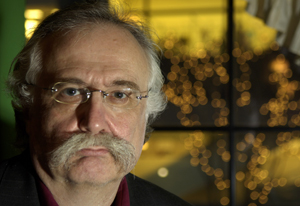|
||
      |
Current affairs
Religion scholar Michael Sells argues that Islam’s conflict with the West is neither eternal nor inevitable.

“Religious-clash ideology,” Sells says, ignores historical
connections between Jews, Christians, and Muslims.
Michael Sells, AM’77, PhD’82, would be happier reading the love lyrics of Baba Fighani, Dhu al-Rumma, or 12th- and 13th-century Sufi mystic Ibn ‘Arabi. He’d prefer to ponder the literary structure and grammatical repetitions of the Qur’an’s Sura of the Compassionate. These, however, are tumultuous times. And so Sells, who last summer became the Divinity School’s John Henry Barrows professor of Islamic history and literature, spends many days parsing the intricate animosities between Islam and the West. He writes and coedits books with titles like Jihad and Crusade: Religion and Violence after the Cold War (forthcoming), The New Crusades: Constructing the Muslim Enemy (Columbia University Press, 2003), and The Bridge Betrayed: Religion and Genocide in Bosnia (University of California Press, 1996). He delivers talks like the one he gave in February at the U of C Women’s Board annual dinner, challenging the notion that the Muslim and Western worlds are locked in inexorable conflict. “Religion is a force like nuclear energy, magnetism, or gravity,” Sells told the board audience. “Any question asked of it is valid, but any conclusion—especially related to the ‘clash of civilizations’—has to be carefully thought out.”
Coined and popularized by scholar Bernard Lewis in the 1990 Atlantic Monthly essay “The Roots of Muslim Rage,” the clash-of-civilizations theory posits that Islam has been warring with the West since the religion’s 7th-century founding. History begs to differ: a more accurate analogy, Sells argues, would be two bodies of water separated by a continent but joined by the currents that flow between them. “Until the colonial period, the great political entities were Christendom, in which European states were ruled by Christians but built upon Christian-Jewish-Muslim thought and culture, and Islamdom, which was ruled by Muslims but based upon Muslim-Jewish-Christian thought. They’re interconnected.”
Tracing the real roots of today’s religious strife, Sells says, means understanding the potential for “conflict-oriented symbolism” not only in Islam but also in Christianity and Judaism. It requires a grasp of geopolitical motivations, cultural power, and media attention that highlights some aspects of religion while suppressing others. “Bosnia was a warning,” he says. In the former Yugoslavia, “religious-clash ideology was used to justify war, to justify religious and ethnic expulsion.” Texts and stories once cited to critique dogmatism were pressed into service to sow religious discord and spawn ethnic-cleansing militias. “Conflict-identity ultimately can become a self-fulfilling prophesy,” Sells says. He points out that the Saudi-authorized translation of the Sura Fatiha—“the Islamic Lord’s Prayer”—includes explanatory parentheses suggesting that “those who earn divine wrath” should be read as “the Jews” and “those who have gone astray” as “the Christians.” Consequently, a prayer of self-examination becomes, Sells says, “a triumphant affirmation of religious superiority.”
Once polarized, societies tend to revise the text of their histories according to perceived age-old antagonisms. “There’s a vicious cycle that when people feel in a state of conflict, they listen to conflict interpretations of their religion, and those interpretations fuel conflict.” Americans are not immune to historical and religious reinterpretations, Sells warns. Opposite the oft-chronicled “Arab street” of popular Muslim opinion stands the flickering “American screen,” constantly televising images of Islamic violence. Where, he wonders, are the pictures of Muslims at the market, at school, or having dinner with friends—“doing the things they do 99 percent of the time?” Western anti-Muslim sentiment, goaded in part by the media, encourages policies that “do great violence in the Muslim world.” Sells offers a pair of examples: support for Saddam Hussein during Iraq’s catastrophic, genocidal war with Iran and the following years of economic sanctions that primarily affected Iraq’s ordinary citizens. Public sentiment also translates into reluctance toward reforms that might ease tensions with the Middle East: raising gas mileage standards, reining in energy consumption, buying smaller cars, and stopping suburban sprawl. Americans must do these things, Sells insists, just as they must—so far as they can—halt any “military and cultural occupation” of Islamic territory. For their part, the “quiet majority” of Muslims must resist “militants who use symbolic warfare to create riots and push their own agendas.”
Arriving in the Islamic world in 1972 as a Peace Corps volunteer, Sells fell in love with Arabic poetry and philosophy. “I was fascinated by its connection to Greek and Roman and French and German philosophy at a time when those worlds were closely connected,” he says. In 1999 he published Approaching the Qur’an, an annotated translation of the holy book’s earliest chapters. After 9/11, University of North Carolina administrators caused a stir by assigning the book to the freshman orientation reading list.
Protesters flocked to campus; some students refused to read it. Mostly, though, Sells says his students—both at Chicago and Haverford College, where he taught from 1984 until last year—are eager to grapple with the topic of religion and violence. His Women’s Board audience seemed similarly engrossed. In a Q and A, listeners asked Sells to rate the chances of Western harmony with orthodox Islamic societies. “Is conflict between religions basically a struggle for power?” one woman asked, a question Sells declared so complex he dared not answer. “American colleges are very willing to confront the hard truths about religion—including their own—in a comparative framework that asks the same critical questions of all religions,” he says later. “And that’s positive.”